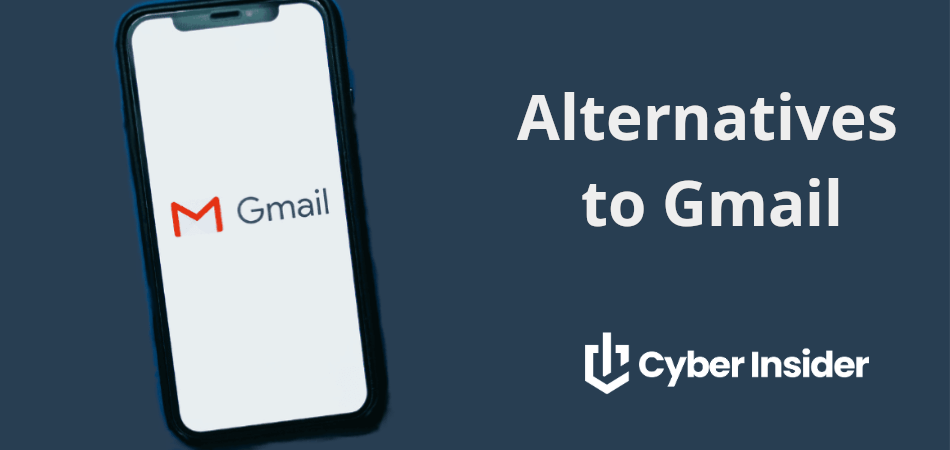
Gmail is an incredibly popular email service. It has billions of users who daily take advantage of its features and popularity. However, Google has long held a reputation for sucking up a lot of personal data about its users. That's why millions of people are looking for alternatives to Gmail.
In a Forbes article about Gmail privacy, Andy Yen CEO of Proton Mail, stated that, It shouldn’t come as a surprise to see how much personal data Gmail collects. Google’s entire business model revolves around collecting as much private information on users as possible in order to benefit advertisers and other third parties. If privacy is important to you, you should definitely be looking for a Gmail alternative.
Why Look for Gmail Alternatives?
Gmail is one of the most popular email services, but it may not be the best fit for everyone. There are several reasons why you might want to consider Gmail alternatives. Here are a few:
Privacy and Security Concerns
Gmail’s data collection and advertising practices have raised concerns among users who value their privacy. Google’s business model relies heavily on collecting user data to serve targeted ads, which is a problem for those of us who prioritize our online security.
If you’re looking for an email service that prioritizes security and data protection, you may want to consider alternatives like Proton Mail or StartMail. These services offer end-to-end encryption and zero-access encryption, ensuring that your emails remain private and secure.
Limited Customization Options
While Gmail’s interface is clean and user-friendly, it may not offer the level of customization you need. If you’re looking for an email service that allows you to personalize your inbox and tailor your experience, you may want to consider an alternatives like Proton Mail or Zoho Mail. For example, Proton Mail allows you to customize your email experience with custom layouts, and it integrates seamlessly with other Proton apps, enhancing your productivity. Zoho Mail offers similar options and integrates with the family of Zoho apps.
Things to look for in a Gmail alternative
There isn’t an email service that serves as an exact replacement for Gmail. So, we looked for several characteristics that would give most of the benefits of Gmail, but without sacrificing user privacy. Here are the main things we were looking for.
The ability to import messages and contacts from Gmail
A safe jurisdiction that respects privacy
End-to-end (E2E) encryption for truly private messages
The non-email features you need such as a calendar, notes, and tasks
We’ll cover each of these in detail, but first, let’s look at the best Gmail alternatives that made our list for 2025, along with some exclusive discounts
Proton Mail – Best for strong encryption with extensive features and extra security tools, our top recommendation (with a 25% off coupon)
StartMail – Private email hosted in The Netherlands (50% off coupon)
Mailfence – A secure and customizable email service
Tuta Mail – Secure Email for Any Device
Mailbox.org – Affordable private German email service
Posteo – Reliable anonymous email service
Runbox – Private email in Norway
Zoho Mail – Secure business email service provider
Kolab Now – Swiss email, compliant with GDPR, HIPAA, and PCI
Soverin – Basic private email service
Now let’s talk a bit more about the things to look for:
1. Convenient email and contact migration
Assuming you are a Gmail user looking to switch, you probably have messages and contacts that you’ll need. In the mini-reviews that follow, we’ll let you know what it takes to migrate all your data out of Gmail and into the Gmail alternative.
2. Located in a safe jurisdiction
No matter how privacy-focused an email service is, it must comply with the laws of its jurisdiction. Some locations, like Switzerland, offer more robust privacy protections compared to others, such as the United States.
The U.S. is part of the Five Eyes surveillance alliance and has laws that allow government surveillance and compel companies to assist. National Security Letters can force companies to spy on citizens without a judge's approval, often accompanied by gag orders preventing disclosure.
A few years back, the U.S.-based encrypted email service Lavabit shut down rather than compromise user privacy. However, not all services are as committed. Some have cooperated with authorities, handing over user data.
Knowing an email provider's jurisdiction helps assess potential privacy risks. Choosing a service with end-to-end (E2E) encryption ensures that only users and recipients can access emails, even if the service is compelled to disclose information.
3. Availability of End-to-end (E2E) encryption
End-to-end encryption is crucial for email privacy. It ensures your messages are encrypted before leaving your device and can only be decrypted by the intended recipient. This means that even if your emails pass through the service's servers, they remain inaccessible to the email provider.
Given the frequency of data breaches, such as those affecting the US government, E2E encryption is essential for safeguarding your communications.
Privacy Tip: Enhance your online privacy by using a reliable VPN to conceal your IP address and encrypt your internet traffic. We recommend NordVPN, a top-rated service with proven privacy and security audits. Get the best NordVPN discount here >>
Drawbacks of PGP/OpenPGP
In recent times, PGP is being superseded by OpenPGP, an open source variant of PGP that can be used freely by any email service. However, both of them have some drawbacks that have to be discussed.
PGP and OpenPGP do not encrypt email subject lines
This also includes the sender and recipient email addresses. Information about your email messages is valuable even if a snoop can't read the content of the messages. Knowing what the Subjects of all your messages are and who you are emailing is still quite valuable for intel gathering. So, this facet of PGP and OpenPGP is not ideal.
The hassle of dealing with encrypted email messages.
Unless both parties are using an automated E2E email service, someone will still have to deal with PGP key creation and management, as well as encryption/decryption of messages. This may overwhelm some users that are not tech-savvy.
As you will see, some services do not use PGP or OpenPGP to encrypt their messages. These have their own pros and cons, which we will mention in the mini review section.
Using VPNs to enhance your safety and privacy
Using a reliable VPN based in a privacy-friendly jurisdiction is another effective strategy for safeguarding your online presence. A VPN connects you to a server in another country, masking your IP address. Since your IP address is a primary identifier online, hiding it makes it more difficult for trackers to associate your online activity with you.
Premium VPN services also offer obfuscated servers, which hide the fact that you're using a VPN, further enhancing your anonymity.
The vulnerability of browser-based email
Many email clients operate directly in your browser, offering convenience since there's no need to install a separate app, and they are always up-to-date. However, even with a secure browser, browser-based clients can be vulnerable due to potential weaknesses in encryption libraries. Email services are aware of these vulnerabilities and take measures to mitigate them.
For enhanced security, consider using a standalone email client or mobile app instead of relying solely on a browser-based client. Standalone clients and mobile apps generally provide better security.
Regardless of your choice, using a robust VPN with advanced security features, like NordVPN or Surfshark, can further protect your online activities. These VPNs offer ad-blocking features that filter out ads, trackers, malware, and phishing sites, reducing the risk of attacks reaching your browser.
No Gmail alternative is perfect
I was looking for email providers that could tick all the boxes above. This was easier said than done. In the end, I settled for 10 quality email services that, depending on your needs and circumstances, could serve as viable alternative.
Here is the criteria I’ve used to find the best services:
1. Access to non-essential email features
While Gmail is known as an email service, it can do much more than just send and receive messages and manage contacts. It has a calendar, notes, and tasks features as well. If you are looking for a reliable Gmail alternative, and use one or more of these non-email features, it would make sense to focus on services that also offer these tools.
Some of the email services we'll talk about have all those capabilities. Others are more minimalistic. Knowing which features you want in your Gmail alternative will help you narrow down your options.
2. Nice to haves
In addition to the above, it is nice to have as many of these features as possible:
IMAP and POP or SMTP protocol support lets you connect to other encrypted email apps
Open source code, which we consider to be less likely to have major bugs or hidden backdoors
Anonymous registration and payment, which lets you subscribe to the Gmail alternative without sacrificing your privacy
Custom email domains for presenting a more professional face to the world
The best Gmail alternatives for 2025
Now that you know what characteristics I looked for when I reviewed Gmail alternatives, let’s look at the final result. Here are the 10 best options:
1. Proton Mail – A secure Swiss Gmail alternative
| Based in | Switzerland |
| Storage | 15 – 1,000 GB |
| Price | $1.99/mo. |
| Free Tier | Up to 1 GB |
| Website | Proton.me |
Proton Mail is perhaps the best-known of secure and private email services. Fame doesn’t necessarily equal quality or value, but in this case, it does. Based in Switzerland, Proton Mail's emphasis on privacy and security is evident through its strict privacy laws, robust encryption, and unique features like password-protected emails. This is an easy-to-use service with an attractive user interface as you can see here:
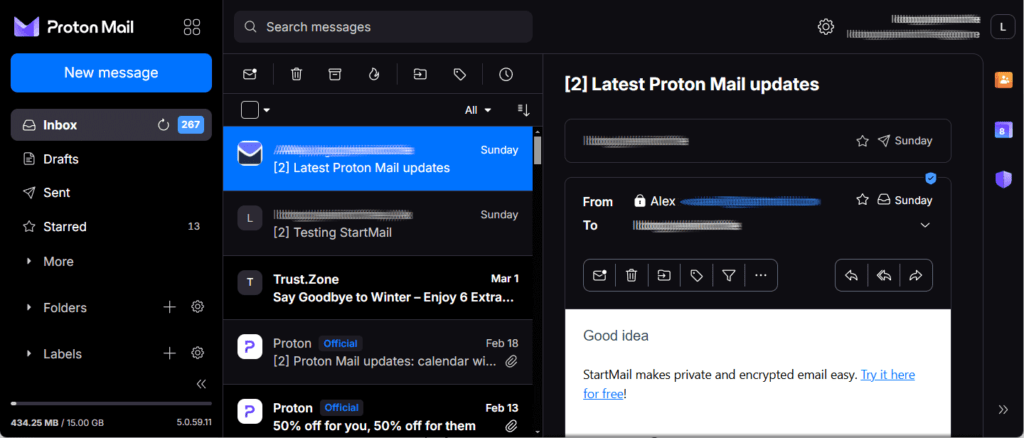
Proton Mail can integrate with the other services in the Proton family of security and privacy suite. These include:
Proton Calendar – an encrypted calendar app.
Proton Drive – a way to share stored files by sending secure links.
Proton VPN – one of the leading VPN services on the market today. It can greatly improve your online privacy.
Other features that make Proton Mail so appealing include:
Supported platforms – Windows, macOS, Linux, Android, iOS, and Web browsers.
Proton Mail Bridge – a tool that lets you sync messages between Proton Mail and other email apps.
Email aliases – keep your real email private by using aliases.
Custom domains – manage your other email accounts within Proton Mail.
Two-factor authentication (2FA) – boost your security by requiring a password and an authenticator app code.
Automatic spam filter – automatic spam filtering.
Tracking protection – blocks tracking pixels and hides external images.
IP address protection – keeps your IP address out of messages.
Auto-reply – automatically reply to incoming messages.
Messaging non-users – send encrypted, password-protected messages to non-users for secure communication.
Address verification – to boost your security.
Self-destructing messages – automatically eliminate messages that you don’t want hanging around for posterity.
See all Proton Mail features here >>
Intuitive email migration
Switching from Gmail to Proton Mail is convenient, since you will be able to use the built-in Easy Switch tool. With it, you can quickly import your emails, contacts, and calendar data.
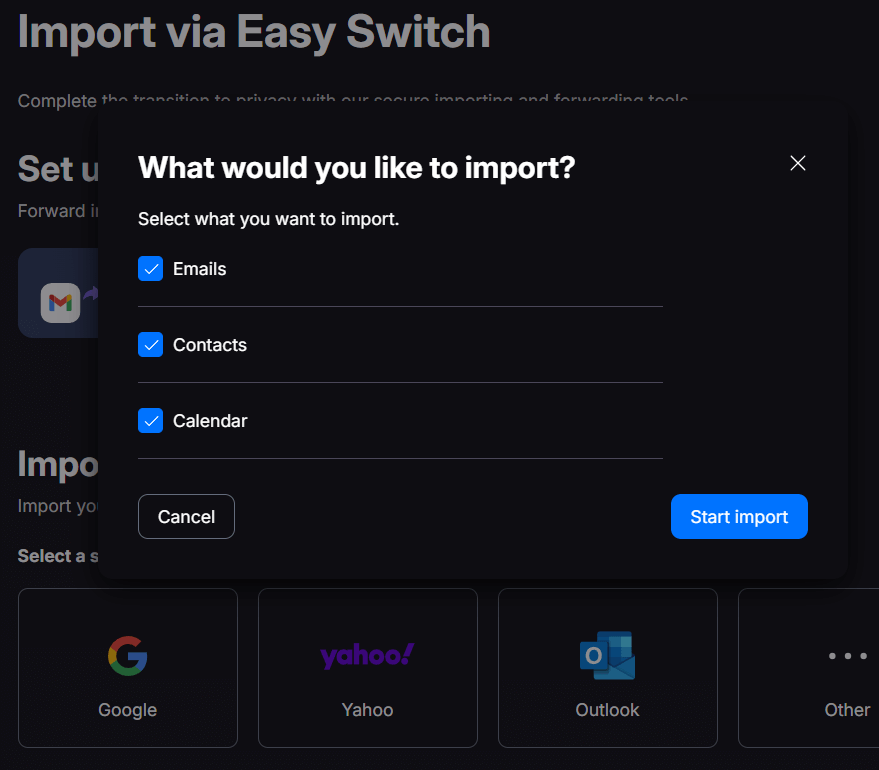
While it may lack some of the additional features Gmail users are accustomed to, Proton Mail is a quality email provider and a great choice for many users. While it's pricing is above average, there is also a free version of Proton Mail that may also suit your needs.
+ Pros
- End-to-end (E2E) and zero-access encryption for Email, Calendar, and Contact information
- Operates under Swiss jurisdiction
- All data stored on servers in Switzerland
- Apps for Android and iOS mobile devices
- Web client, encryption algorithms, Android and iOS code are all open-source
- Support for custom domains
- Strips IP addresses from emails
- Can be used with third-party email clients through the Proton Mail Bridge feature
- Can import contacts and emails
– Cons
- Subject lines not encrypted
- May require personal information for verification of new accounts
Proton Mail Cyber Deal is live:
Get 60% Off Proton Mail one-year plans using the exclusive coupon below:
(Coupon is applied automatically; 30-day money-back guarantee)
For more details, check out our Proton Mail review.
2. StartMail – Server-side encryption and third-party email support
| Based in | The Netherlands |
| Storage | 20-30 GB |
| Price | $3.00/mo. |
| Free Tier | 7-day trial |
| Website | StartMail.com |
StartMail is a secure email service from the Netherlands. The Netherlands is known for its strong privacy protections. According to StartMail's privacy policy, the company is committed to collecting the minimal amount of user data necessary to provide its service effectively.
StartMail is known for robust security features, including two-factor authentication and end-to-end PGP encryption. A standout StartMail feature is unlimited aliases. You can set time limits for these aliases, ranging from single-use to indefinite, providing flexibility and control over your email privacy.
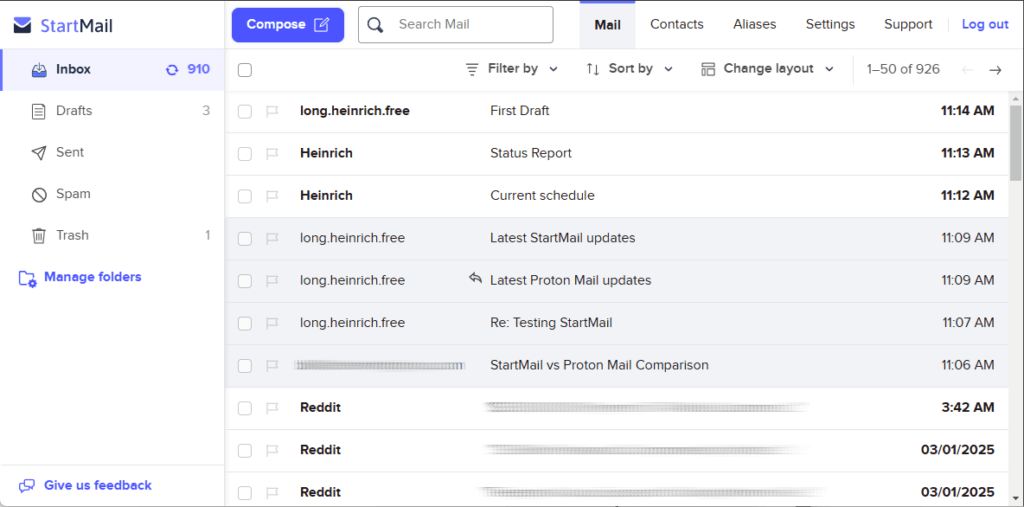
StartMail doesn't have its own apps, meaning you will need to use it in the browser, or use its IMAP and SMTP support to run it on other email apps. You can import your Gmail messages and contacts to StartMail using their ShuttleCloud migration service.
See all StartMail features here >>
StartMail encrypts your email on the server, unlike most services that opt for browser encryption. Their white paper explains the benefits of this approach. While we remain skeptical, it's worth reviewing to form your own opinion.
StartMail offers some advantages, but also has its downsides. Before committing to the relatively high subscription fee, take advantage of their 30-day limited free trial to thoroughly evaluate the service.
+ Pros
- Create unlimited email aliases
- PGP end-to-end encryption
- Easy contacts and email migration
- Organize your inbox with filters
- Minimalistic design
- No ads. No tracking. No spam.
- Flexible spam filter
- Anonymous cryptocurrency payments
- Use custom domain
- Compliant with GDPR
- 7-day free trial
– Cons
- No free version
- Lacks calendar, notes, and file storage
StartMail Exclusive Coupon:
Get 50% off ANY subscription plan with the coupon below along with a 7-day free trial:
(Coupon is applied automatically)
For more information, check out this StartMail review.
3. Mailfence – A feature-rich option
| Based in | Belgium |
| Storage | 11 – 225 GB |
| Price | 2.75/mo. |
| Free Tier | Up to 1 GB |
| Website | Mailfence.com |
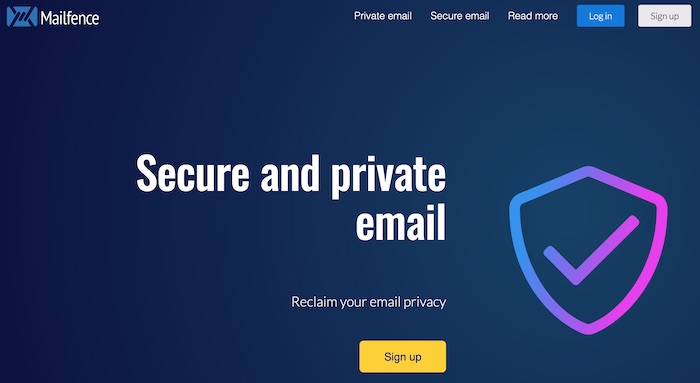
Mailfence is a feature-rich, secure Gmail alternative from Belgium. It offers a calendar, file storage capacity, and groups in addition to the standard email and contact support you might expect. Mailfence has built-in OpenPGP support, which means your that it is secure and compatible with other popular email services. However, its subject lines and email addresses are still unencrypted.
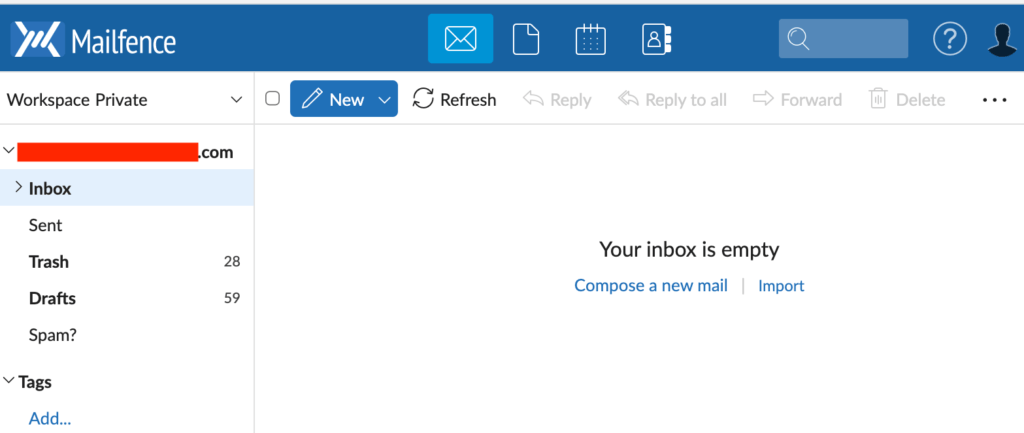
During our testing for the Mailfence review, we found a lot to like about this service. It has an intuitive design, attractive layout, and many extra features. Two things we were happy to learn was that Mailfence offers email and phone support, and they accept cryptocurrency payment, so you can remain fully private when subscribing.
This service encrypts all of your messages in the browser, giving you full E2E protection. No nosy third parties, nor even Mailfence's engineers, can read your emails.
Mailfence provides detailed instructions for importing your messages and contacts from Gmail, but the process is more complicated than that of either Proton Mail or StartMail. to can import messages and contacts from virtually any other mail service, as it supports POP, SMTP, IMAP, and Exchange ActiveSync. The service provides its own web app as well as a progressive web app (PWA), which works on Android and iOS devices with certain browsers.
Note: Mailfence has recently stopped supporting POP/IMAP connection to Gmail servers because of Google's financial requirements.
All in all, we think Mailfence is one of the best options for you if you want to move away from Gmail as well as productivity suites like G Suite and Office 365.
For more info see our full Mailfence review.
4. Tuta Mail – Private email with AES security
| Based in | Germany |
| Storage | 1 – 1,000 GB |
| Price | €3.00/mo. |
| Free Tier | Up to 1 GB |
| Website | Tuta.com |

Tuta Mail (formerly Tutanota) is a secure email service based in Germany, run by privacy enthusiasts. Unlike Proton Mail, Tuta Mail is less known but highly respected in the secure email space. It uses a hybrid encryption system with AES and RSA, offering enhanced privacy by encrypting subject lines and email addresses in headers. Tuta Mail's GDPR compliance ensures your privacy rights are well-protected.
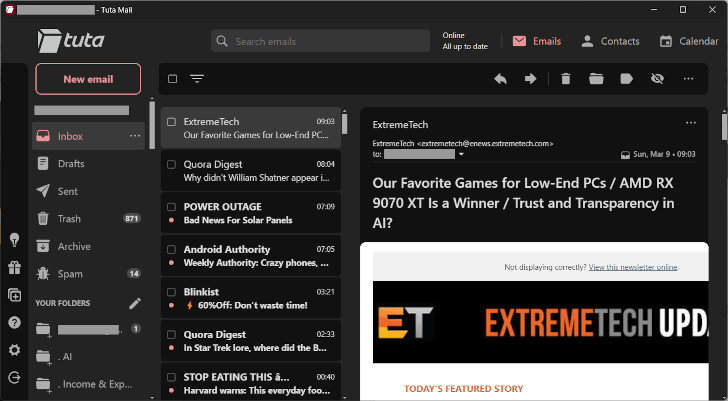
Tuta Mail provides full end-to-end encryption for your inbox, contacts, and calendar, with data encrypted at rest on German servers. While it doesn't support PGP, it offers a seamless experience for Tuta Mail users, automatically encrypting and decrypting messages. For non-Tuta Mail users, you can send encrypted emails with a password-protected link.
Tuta Mail is safe, but not compatible
Tuta Mail is very secure, but because it doesn't use PGP, its compatability with other email services is limited. To explain why it does not rely on PGP standards, Tuta cofounder Matthias Pfau wrote this piece for CyberInsider readers: Let PGP Die: Why We Need a New Standard for Email Encryption
Tuta does not support importing emails from other services since it has no POP, IMAP, or SMTP support. The company says they are working on a fix for this, but we have seen no indication when or if it will be available.
Although it is not compatible with many email services, Tuta Mail has a strong cross-platform support. It offers a web app, Windows, macOS, and Linux desktop apps, along with apps for Android and iOS.
While Tuta Mail isn't perfect, it is pretty darn good. If you are looking for a high-security replacement for Gmail run by a team of privacy enthusiasts, Tuta Mail is worth checking out.
Website: https://tuta.com/
Check out the Tutanota review for more info.
5. Mailbox.org – A comprehensive Gmail replacement
| Based in | Germany |
| Storage | 2 – 100 GB |
| Price | 1.00/mo. |
| Free Tier | None |
| Website | Mailbox.org |
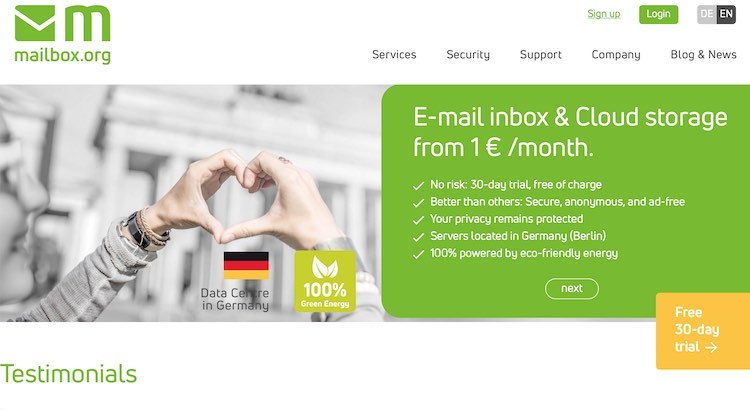
Mailbox.org is a secure, open-source email provider based in Germany. It offers more than just an email account; it provides a comprehensive email and productivity suite. This includes Mail, Calendar, Address Book, Drive (cloud storage), Tasks, Portal, Text, Spreadsheet, Presentation, and Webchat. Despite its extensive features, Mailbox.org maintains a user-friendly design, ensuring you don’t have to compromise between functionality and security.
With full PGP support, Mailbox.org allows you to encrypt all your data stored on its Germany-based servers. It supports SMTP, POP, and IMAP, enabling you to use third-party mobile email apps, as it doesn’t have its own apps. This service also provides a detailed guide to moving from Gmail to Mailbox.org. It takes some manual work, but the support for POP and IMAP lets you automate most of the job.
Although Mailbox.org doesn’t offer a free plan, it provides a 30-day trial. If you decide to continue, you’ll find it one of the most affordable options, with basic plans starting at just €1 per month. These plans include varying amounts of mail storage, ranging from 2 GB to 100 GB, with higher-tier plans offering more features and storage.
Note: Mailbox.org frequently receives requests for information from “public authorities.” In 2024, they received 83 requests for information, and ultimately rejected 25 of them. They responded to the rest of them as required by law.
Website: https://mailbox.org/
See our Mailbox.org review for more details and test results.
6. Posteo – Lots of features and an emphasis on extreme privacy
| Based in | Germany |
| Storage | 2 – 20 GB |
| Price | €1.00/mo. |
| Free Tier | None |
| Website | Posteo.de |
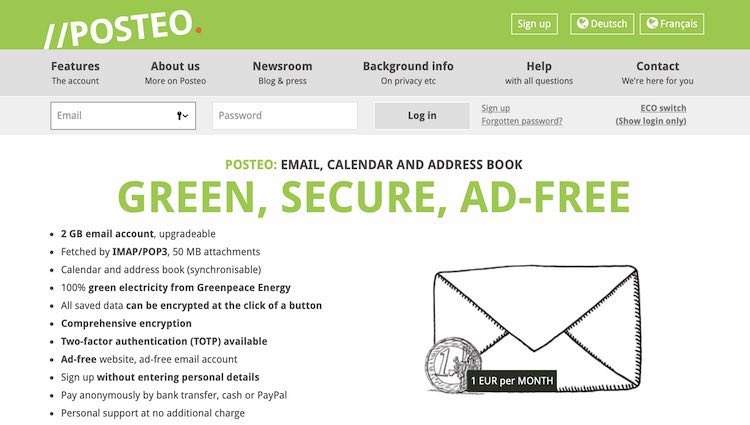
Posteo is a highly secure email service provider based in Germany, operating since 2009 and serving as a mature Gmail alternative. Besides offering a basic email account, Posteo provides you with 2 GB of storage, a calendar, a notes app, and more. A recent feature is an attachment browser with a photo stream, allowing you to manage attachments without opening individual emails.
Posteo resembles Mailbox.org by offering extra tools, encrypting messages with OpenPGP, and maintaining similar pricing. You can import Gmail using IMAP and POP and synchronize your Gmail contacts before switching to Posteo. However, it lacks custom domains, a spam folder, and a free or trial version.
Posteo is dedicated to protecting your privacy. It employs strong encryption, removes IP addresses from messages, and keeps no logs. It was the first company to implement DANE, enhancing security further. You can also make anonymous payments, including sending cash by mail, to avoid a digital trail. If you use a credit card or PayPal, Posteo separates your account details from payment info.
While Posteo does not offer its own apps, you can easily integrate it with your preferred third-party email clients.
Website: https://posteo.de/
Check out the Posteo review for more info.
7. Runbox – A reliable Gmail alternative with long history
| Based in | Norway |
| Storage | 2 – 50 GB |
| Price | $1.66/mo. |
| Free Tier | 30 day trial |
| Website | Runbox.com |
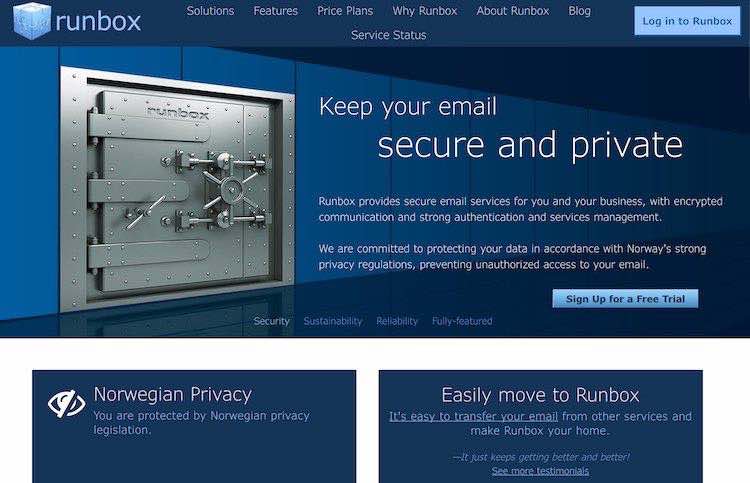
Although Posteo has been around for 12 years, Runbox has a longer history, operating for over two decades in Norway. Norway is a great location for privacy, with strong legal protections and secure data centers where Runbox's servers are located.
While Runbox doesn't offer end-to-end encryption, your communication with their servers is securely encrypted. However, your messages on Runbox servers aren't encrypted. You can use PGP with Runbox, but it's not fully integrated, similar to Gmail. Despite this, Runbox prioritizes your privacy, unlike Gmail, which profits from your personal data.
Runbox offers features like a calendar and tasks, which will be part of the upcoming Runbox 7 project. You can create up to 100 aliases for your email and enjoy up to 50 GB of email storage and 5 GB of secure file storage, depending on your plan. With full SMTP, POP, and IMAP support, you can easily import your Gmail data and use third-party apps.
To import your Gmail data to Runbox, you'll need to follow their detailed guide, which involves using SMTP, POP, or IMAP protocols. This will allow you to automate much of the migration process, ensuring your emails and contacts are seamlessly transferred to your new Runbox account.
Runbox provides a free trial and a 60-day money-back guarantee on paid plans, making it a reliable Gmail alternative.
Website: https://runbox.com/
See our Runbox review for more info.
8. Zoho Mail– A business-oriented email service
| Based in | India |
| Storage | 5 GB |
| Price | $1.00/mo. |
| Free Tier | 15-day free trial |
| Website | zoho.com/mail |
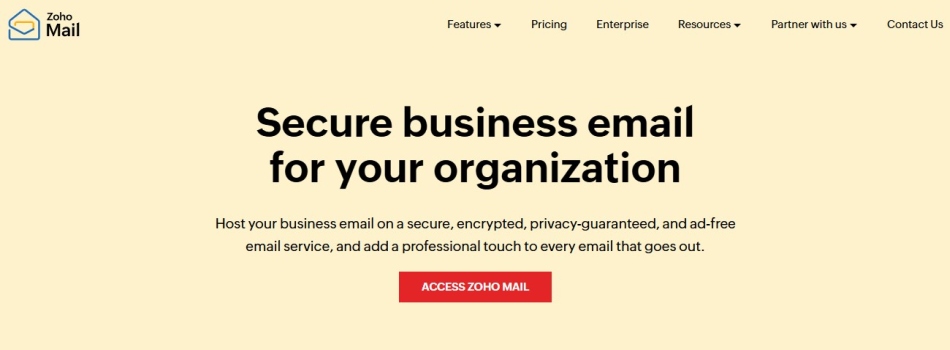
Zoho Mail is a business-focused email service offering secure access and data protection with robust encryption. It enhances productivity with integrated tools like Calendar, Contacts, Tasks, Notes, and Bookmarks, all within the inbox. Zoho Streams facilitates team collaboration by allowing email sharing, commenting, and tagging.
Security is a priority, with emails encrypted at rest and in transit, S/MIME for end-to-end encryption, and two-factor authentication. Zoho Mail's data centers are highly secure, protecting against unauthorized access. The company provide complete instructions for how to move from Gmail to Zoho Mail. However, given its business orientation, the instructions talk about moving from Google Workspace to Zoho Mail.
The Forever Free Plan offers up to five users, each with 5GB of storage and a 25MB attachment limit, along with web access and free Android and iOS apps. Premium plans provide more storage, custom domains, and enhanced security.
While primarily tailored for business use, Zoho Mail's comprehensive tools and security features can also meet personal email needs.
Website: https://www.zoho.com/mail/
9. Kolab Now – Full-featured Swiss email service
| Based in | Switzerland |
| Storage | 5 GB+ |
| Price | $5.47/mo. |
| Free Tier | 30 day trial |
| Website | KolabNow.com |
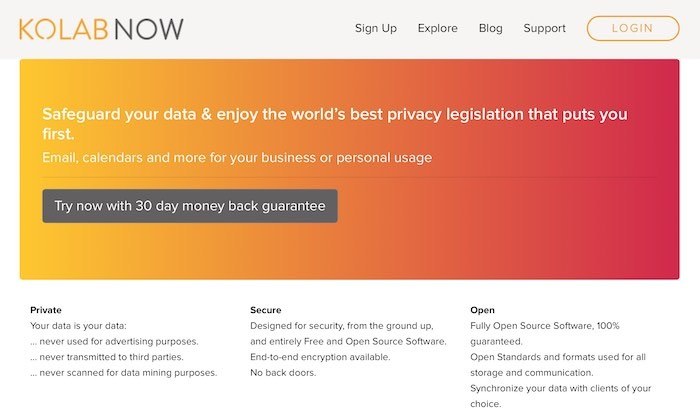
Kolab Now is a full email suite based in Switzerland, one of the best jurisdictions in the world for a privacy-oriented services. A subscription includes email, contacts, calendar, scheduling, collaboration and sharing tools, as well as cloud file storage, which makes it a great option for business users.
Every account comes with 5 GB of free storage space, and you can add more as necessary. Currently, this service is also testing video and voice conferencing system. It's interface is intuitive and makes it easy to organize yourself. A Gmail user is unlikely to feel like anything is missing with this service.
Even better, Kolab Now is 100% open source software, and has E2E encryption with Perfect Forward Secrecy. Since Kolab Now also supports POP, IMAP, and SMTP, you can conveniently manage your Kolab Now messages from any popular third-party email app. To import your Gmail messages and contacts, you can use Google Takeout in just a few simple steps. Your data is stored encrypted on the company's servers in Switzerland.
If you are looking for a full, secure Gmail alternative hosted in Switzerland, you'll want to check out Kolab Now.
Website: https://kolabnow.com/
10. Soverin – Private email service from the Netherlands
| Based in | The Netherlands |
| Storage | 25 GB |
| Price | 3.25/mo. |
| Free Tier | No |
| Website | Soverin.net |
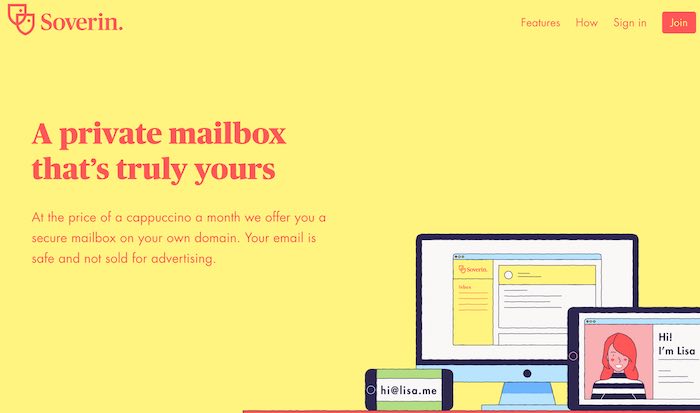
Soverin is an affordable and secure Gmail alternative situated in one of the best jurisdictions for user privacy – the Netherlands. This service offers two plan that let you choose between using Soverin or custom domain. Whichever you choose, you will also get 25 GB of storage with it.
This Gmail alternative stores user data on servers located in Germany. It uses solid SSL/TLS encryption that also removes IP addresses from headers. Unfortunately, its emails are not stored encrypted at rest, so your privacy can still get compromised.
Soverin provides instructions on how to import your Gmail data to Soverin. The process is moderatly complicated (follow this link to see what is involved). If the process looks to complicated for you, consider using Proton Mail or StartMail instead.
Soverin lets you conveniently import old emails and can work in conjunction with many third-party email providers. Keep in mind that this is a minimalistic email service, so you won't find notes or calendar section. Still, Soverin is a decent email provider that complies with European privacy laws.
Website: https://soverin.net/
Conclusion on the best Gmail alternatives
Choosing the best Gmail alternative isn’t a straightforward process. None of these competing email service providers offer the exact same features as Gmail. As a result, you’ll have to decide which Gmail features you need, then search for a new service that provides similar features.
This is why we’ve presented you with these potential alternatives to Gmail. While each has it pros and cons, they all offer more security and privacy.
While finding your best replacement for Gmail can be complicated, we hope that this article has helped you narrow your search. Our top recommendation is Proton Mail. You can get this excellent service for an excellent price if you use this coupon:
Proton Mail Cyber Deal is live:
Get 60% Off Proton Mail one-year plans using the exclusive coupon below:
(Coupon is applied automatically; 30-day money-back guarantee)
Proton Mail not doing it for you? Then consider StartMail. It is another quality service and you can get it for a major discount with this coupon:
StartMail Exclusive Coupon:
Get 50% off ANY subscription plan with the coupon below along with a 7-day free trial:
(Coupon is applied automatically)
Gmail alternatives FAQs
Certain questions kept coming up while we researched this article.
Which are the best Gmail alternatives?
Proton Mail and StartMail are our top recommendations for email services that provide more privacy and security than Gmail.
Can I keep my Gmail messages when I change my email service?
Yes you can, but it may take some work to get them imported into your new email service. You’ll want to check out the mini-reviews in this article to see which services can import messages and contacts from Gmail and check out their support pages to see how they do it.
How can I delete my Gmail account?
To delete your Gmail account on various devices, follow the steps laid on this Gmail Help page. While deleting it isn’t hard, you need to make sure that doing so won’t be a disaster. You probably have a lot of stuff connected to your Gmail account, including emails, service subscriptions, social media accounts, etc. Before proceeding, make sure to provide a new email address to each service.
This Gmail alternatives guide was last updated on March 9, 2025.

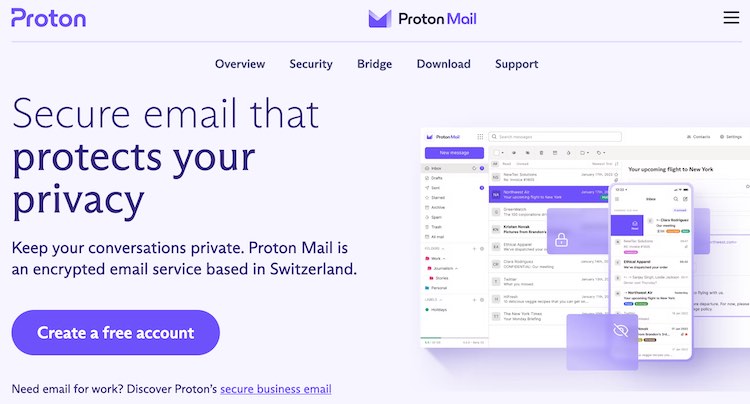
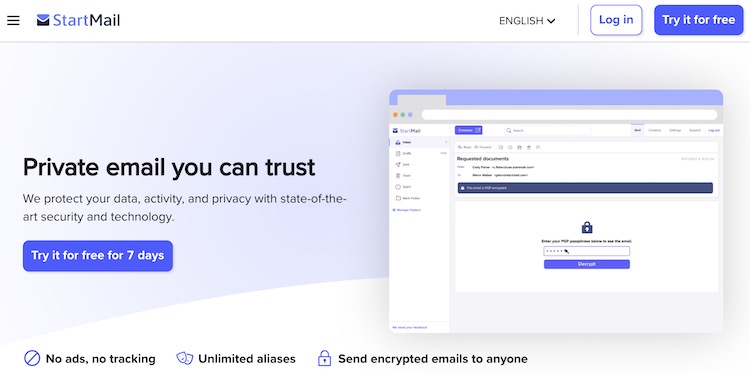
Thank you very much, Alex, not only is this an amazing list of alternatives, it also opened my eyes to many features I haven’t even considered.
Hi,
Countermail has kind of gone out of business. The service works, and it works fine, but all of my support questions have been ignored. I noticed my account expired a month ago, and received no renewal notification. It seems this is happened when new laws prohibited them from accepting Bitcoin payments. So they stopped collection payment bitcoin or dollars. Not taking new members, although as this site explains, maybe there is new members by invite only. They also no longer allow you to have your private domain, although they haven’t stopped existing ones.
This does not give me any confidence. I wish you could seamlessly move your email service over to another company. They should give more information about their future plans. As one who has a few private domains, it will be a lot of work to migrate to a new company.
If cyberinsider.com has anything more to share, please do so
Alex, thanks for your comprehensive, thoughtful mini reviews. I found your comments about the drawbacks of PGP/OPGP and Tuta’s incompatibility VERY helpful. I’ve learned a lot from you and have narrowed my choices to 2. Now to make the final decision…
Happy to help Mark, thanks for stopping by.